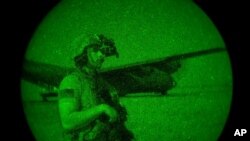Analysts say the redeployment of U.S. troops to Somalia to combat terrorist group Al-Shabab, an Al-Qaeda affiliate, is likely to prevent a looming cold war in the Horn of Africa.
Abdisalem Guled, a security and counter-terrorism analyst in Mogadishu, tells VOA that discussions between Somalia and the Chinese state, as well as the presence of Russian mercenaries in East Africa, could have triggered the United States to resume its military leadership in the region.
Guled says the timing of the announcement shows that the U.S government has confidence in newly elected Somali President Hassan Sheikh Mohamud's vow to defeat Al-Shabab.
The former deputy director at the Somali National Intelligence and Security Agency (NISA), adds that the deployment decision will help undo some of the impact caused by the January 2021 withdrawal of the nearly 750 U.S. troops by the previous U.S. administration.
'' The [U.S. withdrawal] led to Al-Shabaab coming out of hiding, and they managed to attack the government and AMISOM(African Union Troops in Somalia) troops on a larger scale.''
An analysis by the Washington-based Africa Center for Strategic Studies shows that attacks by Al-Shabaab surged by 17 percent in 2021 compared to the previous year. The Washington Post reports that in 2022, attacks are estimated to rise by 71 percent if the current pace of violence continues.
Guled asserts that ''The Somali state and Al-Shabab have equal capacity in terms of military capabilities - vehicles, weapons, etc. But the drone capabilities used by the U.S until their exit could help support the government's resolve in defeating them.''
Sarah Harrison, at Washington-based International Crisis Group tells VOA that a chance to defeat Al-Shabab depends on strategic collaboration with relevant partners such as the Somali state.
She also says that achieving success against al-Shebab and other insurgents depends on Mogadishu addressing the factors that cause people to pick up the gun.
''The biggest obstacles to peace in Somalia remain a lack of reconciliation among political rivals, leading to poor governance and strengthening Al-Shabaab," she said, adding "The policies that would address this problem are complex and diplomatic in nature, and definitely not a job for the U.S. military to solve alone."




